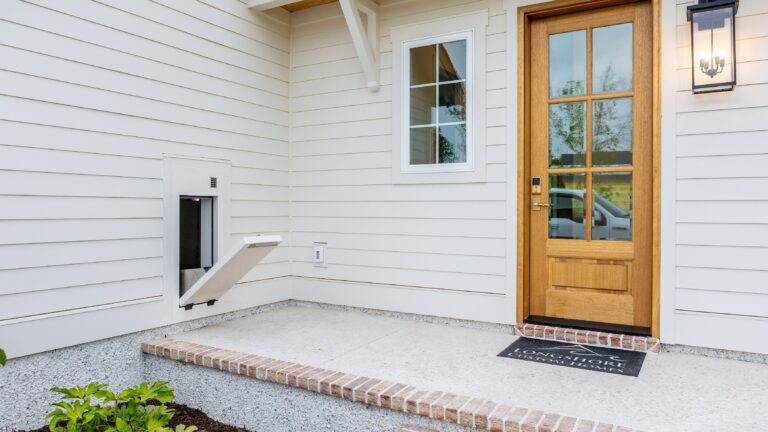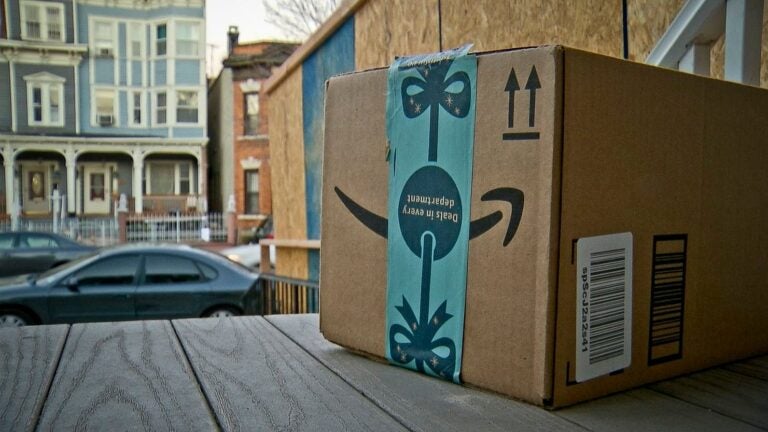Address newsletter
Get the latest news on buying, selling, renting, home design, and more.

When Gabriel Luna bought a ranch home in Shrewsbury in 2019, he had one pressing concern: the mailbox.
At his previous address, numerous packages went missing without explanation, and Luna had had enough. In 2019, Luna, a homeowner and builder, was beginning the process of entirely rebuilding the Shrewsbury home when he began his quest for a solution to thieves.
“We wanted to have a designated mailbox with extra security, which would be convenient, not only for the homeowner, but also for the public services, USPS, UPS, FedEx,” Luna said.
After thoroughly searching for a solution locally, Luna and his family couldn’t find what they were looking for.
“We live in Massachusetts, and it was incredible for us not to be able to find anything in New England that fit the needs for this build,” he said.
Luna landed on MB Sentinel Enterprises, a Texas-based package delivery solutions company. Company founder and coinventor Jeff Kutas recognized that security had become a strain on postal carriers and determined that mailboxes needed to be reinvented to combat porch pirates.
“From curbside to countryside, we have a solution that meets pretty much every requirement for a single-family home or commercial business,” Kutas said. “The Box Gobbler is a great wall hatch for community developers that want to offer last-mile delivery solutions for prospective home buyers.”
But MB Sentinel isn’t the only company inventing anti-package theft products. The Package Guard, a Frisbee-sized device, connects to an IOS app, notifying customers when their packages are delivered and sounding internal alarms if an item is removed by a porch pirate. Another product, the Parcel Box, is a mailbox with a delivery compartment and a key-accessed retrieval door on the side.
Though MB Sentinel has partnered with several major clients like St. Jude Hospital, its products are also designed for multifamily and single-family properties. To account for the wide range of customer needs, MB Sentinel has three types of products: through-wall inserts, fence and column integrations, and curbside and driveway placements.
With larger developments across the West Coast, including eight to 10 in progress, MB Sentinel is growing. But in New England, there are only “a handful” of single-cabinet placements.
“I think people in New England are not well aware of the possibilities,” Luna said.

Nazar Vincent, chief operations manager at New England luxury design firm Attitash Home Builders, said package theft isn’t a major concern with their clients because most of them live in the suburbs. Though some request security cameras, Vincent said, he hasn’t gotten a request for anti-porch pirate devices.
“In the city, [package security] probably would be very important,” Vincent said. “You could be in a nice neighborhood, but you’re near a high-traffic road or an area highly blocked by pedestrians, and you never know who could be walking by and just grabbing a package.”
Even at the National Association of Home Builders, these devices are relatively new. Rose Quint, the association’s vice president of survey research, said package security data were collected recently and will be analyzed this fall.
The prices of these devices also may be slowing their adoption. The MB Sentinel mailboxes range from $1,895 for a package-only wall insert, to $8,455 for an 80-square-foot cabin with a keypad controller.
When Kutas invented the Mailbox Sentinel XL48, a combination mail and package box, many claimed the price was unreasonable. But Kutas said they sell “all the time.”
“I think the main limitation is the cost; however, you pay for what you get,” Luna said. “If you’re spending a little bit more money on something that you probably will never have to spend any additional money on, I think it’s worth the cost.”
Get the latest news on buying, selling, renting, home design, and more.

Stay up to date with everything Boston. Receive the latest news and breaking updates, straight from our newsroom to your inbox.
Conversation
This discussion has ended. Please join elsewhere on Boston.com